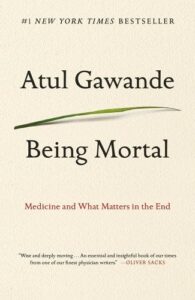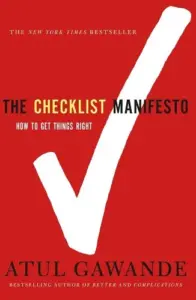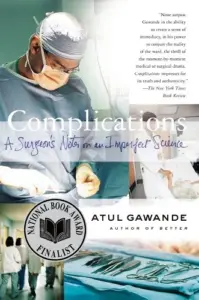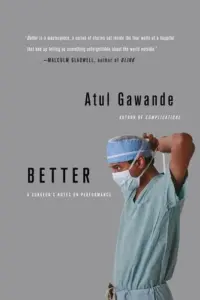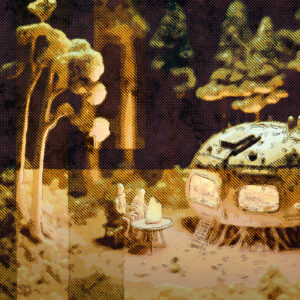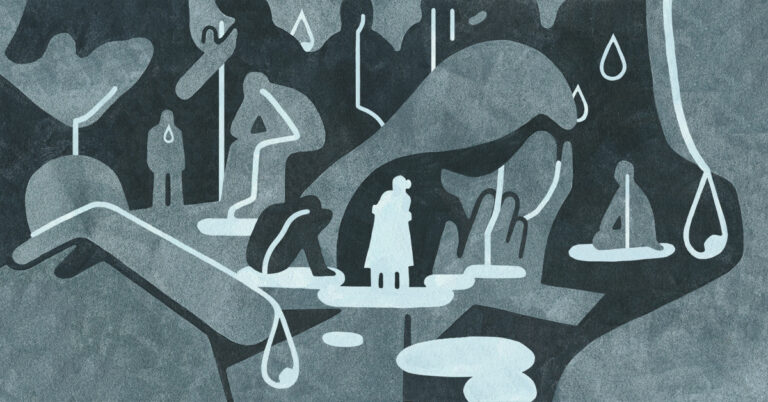Atul Gawande
On Mortality and Meaning
We are strange creatures. It is hard for us to speak about, or let in, the reality of frailty and death — the elemental fact of mortality itself. In this century, western medicine has gradually moved away from its understanding of death as a failure — where care stops with a terminal diagnosis. Hospice has moved, from something rare to something expected. And yet advances in technology have made it ever harder for physicians and patients to make a call to stop fighting death — often at the expense of the quality of this last time of life. Meanwhile, there is a new longevity industry which resists the very notion of decline, much less finitude.
Fascinatingly, the simple question which transformed the surgeon Atul Gawande’s life and practice of medicine is this: What does a good day look like? As he has come to see, standing reverently before our mortality is an exercise in more intricately inhabiting why we want to be alive. This conversation evokes both grief and hope, sadness at so many deaths — including our species-level losses to Covid — that have not allowed for this measure of care. Yet it also includes very actionable encouragement towards the agency that is there to claim in our mortal odysseys ahead.
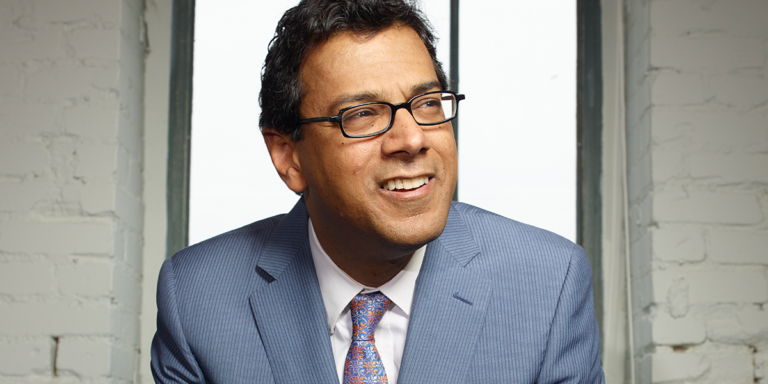
Image by David Yellen, © All Rights Reserved.
Guest
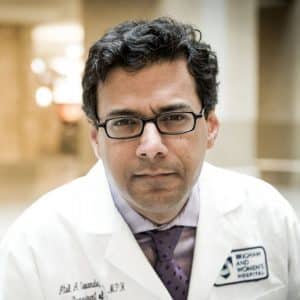
Atul Gawande is a surgeon, writer, and public health official. His pieces for The New Yorker and his books have been read by millions, most famously Being Mortal: Medicine and What Matters in the End. He currently serves as Assistant Administrator for Global Health at the U.S. Agency for International Development. He previously practiced general and endocrine surgery at Brigham and Women’s Hospital in Boston and was a professor at both Harvard Medical School and the Harvard T.H. Chan School of Public Health.
Transcript
Transcription by Alletta Cooper
Krista Tippett: We are strange creatures. It’s hard for us to speak about, let in, the reality of frailty and death — the elemental fact of mortality itself. In this century, Western medicine has gradually moved away from its understanding of death as a failure where care stops. Hospice has moved from something rare to something expected. And yet, advances in technology make it ever harder for physicians and patients to make a call to stop fighting death — often at the expense of the quality of the last time of life.
Meanwhile, there is a new longevity industry, which resists the very notion of decline, much less finitude. Fascinatingly, the simple question which transformed the surgeon Atul Gawande’s life and his practice of medicine is this: What does a good day look like? As he has come to see, standing reverently before our mortality is an exercise in more intricately inhabiting why we want to be alive. This conversation evokes both grief and hope. Sadness at so many deaths — including our species-level losses to Covid — that have not allowed for this measure of care. Yet, it also includes very actionable encouragement towards the agency that is there to claim in our mortal odysseys ahead.
I’m Krista Tippett, and this is On Being.
[music: “Seven League Boots” by Zoë Keating]
Atul Gawande’s writing for The New Yorker magazine and his books have been read by millions, most famously Being Mortal: Medicine and What Matters in the End. He is currently serving as Assistant Administrator for Global Health at USAID. When I interviewed him, he was practicing general and endocrine surgery at Brigham and Women’s Hospital in Boston, and also teaching at Harvard.
Tippett: I think we can just dive in. Do you have any questions for me before we start?
Atul Gawande: Yes. Are we mainly talking about Being Mortal? Or are we thinking we’re going in a lot of different directions?
Tippett: Well, I kind of just want you to put yourself into my hands and let us — let me…
Gawande: So you’ll guide me. OK.
Tippett: I will guide you. And it is really around larger themes — the theme of mortality, but I want to go deep into that. I’ve been reading you for years in The New Yorker, I like to be more sweeping about how you think, as opposed to just what the books are about.
Gawande: Awesome, yeah. That’s awesome. That’s great. Yes, the full Tippett. [laughs]
Tippett: [laughs] That’s right — full Tippett.
So perhaps you know that I always start every conversation with an inquiry about the religious or spiritual background of your childhood, however, you think about that, however, you would define that.
Gawande: My parents are Hindu. I grew up in rural Ohio. It’s hard to grow up in — my little town of Athens, Ohio, it’s a college town in the Appalachian foothills near the West Virginia border — and it’s hard to grow up a Hindu in rural Ohio. [laughs] It’s such a cultural religion. It’s deeply embedded. Even the way my mother, who comes from North India and a big city, and her family managed temples, to where my father came from in the middle of India in a very small village. And their own traditions of Hinduism are very different from one another, which gods they most revered and the prayers that they told. And then I didn’t grow up with the language. So I grew up a Hindu, but I’m a sort of apostate Hindu of a religion that doesn’t even know the idea of there being an apostate, it’s such a wide-open, ecumenical, welcoming religion. And so I still call myself Hindu, but I’ve never really been practicing, though my parents raised me praying every weekend, and they prayed every day, and being sort of steeped in it.
Tippett: I have actually found it’s very hard to speak — I think this is true in general of religion, — that it’s hard to speak about it — but I think that that’s true especially with Hinduism because it is so much about practice. And it is so wide-open. It’s not ideas. Do you know what I mean?
Gawande: It’s a way of — it’s so embedded in the culture. The line between how do you treat your mom and your dad, how are you supposed to grow up, and your ways of praying, it’s seamless. It’s not easy to separate it. For example, I grew up that you never put your foot on a book, because a book is spiritual, and it’s wisdom, and it’s meaningful. And so if I ever put a foot on a book, I had to apologize to the book, put my hand on it, and apologize. And I grew up doing that. And I cannot, to this day, put a foot on a book. It is — it’s just sacrilegious. It is dishonoring not only the book but everything that matters behind it. And it’s inseparable. It’s a way of living and a way of praying, I suppose.
Tippett: It’s a whole different way of putting the word “sacred” and “text” together. [laughs] I love that.
This whole matter of our mortality. And I was looking at the — just thinking about the title, Being Mortal, and the fact that that is a fact, that being alive is a fatal condition, [laughs] that we all do have a diagnosis that we will die, and that you experience again and again and write about how — that people are almost always surprised. It’s just so fascinating about us. And do you think — is it that we don’t let it into our consciousness, that we haven’t gotten to the point where we can, or that we resist that?
Gawande: I dove into that topic because I was as confused about it as you are. [laughs] First of all, I didn’t know what it meant to be a good doctor for mortal beings. The question of what does it mean to be competent with people who are going to have problems you cannot fix? What does it mean to go beyond competence and actually be really great at problems that people are going to die from? And also, how do you become competent and great at it if you don’t know whether the problem you’re dealing with, with certainty, is one they’re going to die from or not?
And at the end of the day, that’s why I write, because those kinds of questions — I can’t answer them straightforwardly sitting in my armchair or just doing my surgical thing. I get to go out — when I say, “Hey, I’m going to see you as a writer today,” — I get to go out and ask people tons of questions. And I think what came out of that, for me, was a general sense that peering in at why — part of it was that I slowly figured out, we’re just getting the question wrong. I thought of it as — the situations that disturbed me the most were ones where someone would come in, they’d have a condition that I knew was incurable, a terminal cancer. But we don’t know, is it going to be a year? Is it going to be three years? Is it going to be five years? And therefore…
Tippett: And that bar keeps moving all the time now.
Gawande: That’s right, we have new technologies. And so we’re going to start trying stuff. And then I have so often been there when we’ve said, “Let’s try that one more thing.” And they’re in a bad situation. We say, “Well, should we try surgery? Yes, we have to give it a try.” And then they never wake up again. And then you see the suffering that has come from that, because we never once talked about the fact that their life might be mortal, is mortal. And I didn’t even know how to begin to have that conversation, and they never woke up; they spent the next couple weeks in the ICU, and then we unplugged the machine. They didn’t get to say goodbye. They didn’t get to say, “I love you.” They didn’t get to say, “I’m sorry.”
And the families, I see that they’re tortured. But then you see, also, when people have those kinds of endings, six months later, they’re more — families are more likely to have PTSD symptoms and depression. And there was partly wanting to understand, how do I do better in that situation? What does it mean to be more confident and competent in those situations? But it also gradually came to — what I slowly realized was that it wasn’t about having a good death. I interviewed more than 200 patients about their experiences with terminal illnesses and that world, and then scores of experts of various kinds; palliative care doctors, hospice doctors, and nurses, and home health aides, and so on. And what I realized is, we were not really talking about death or dying. We were really talking about: How do you live a good life all the way to the very end, with whatever comes? And that’s where you begin to unpack.
Tippett: And that’s such a different question than “How do I fix this? How do I cure this?” And I’ve spoken to so many people across the years who were there at the advent of the hospice movement or have been involved in that, and — you even write about that. Even when you were becoming a doctor, when you were going through your medical training, it was about “How do I fix this?” And then death was a failure — at the point at which somebody was definitely going to die, medicine stopped.
Gawande: Yeah, that’s exactly right. The conversation I felt like I was having was, “Do we fight, or do we give up?”
Tippett: Right, right. [laughs]
Gawande: And the reality was — and that was where you said something, you said, “That’s such a different question.” What it took me a long time to figure out was, it’s just the wrong question. It’s not “Do we fight, or do we give up?” It’s “What are we fighting for?” People have priorities besides just surviving no matter what. You have reasons you want to be alive. What are those reasons? Because whatever you’re living for, along the way, we’ve got to make sure we don’t sacrifice it; and in fact, can we, along the way, whatever’s happening, can we enable it?
And that sense that a conversation about the end of life is, “Do you want chest compressions? Do you want a ventilator? Do you want to be shocked?” — that’s not the conversation. No one has, as their goal: “that I get shocked before I die.” The conversation is, “As you face what you’re facing, as you go through what you go through, what are you willing to sacrifice, and what are you not willing to sacrifice, along the way, for the sake of more time? What’s the minimum quality of life you’re really going for here, that you would find acceptable?” And then, “Can I make sure — to the extent of my abilities, the extent of abilities we have today in medicine, can we protect that for you?” And the answer is often yes, and often the answer is — sometimes the answers are technological, but they’re often not. It’s often just a matter of being humane.
Someone said to me, “Well, I want to take my children to Disney World, my grandchildren. One thing I want to make sure I’m able to do is take my grandchildren to Disney World.” And she was telling that to me in the hospital, emaciated, on her last days. She would die 48 hours later. And we had missed that. We had failed. We had never asked her, to know that might have mattered to her — because we could have made that possible for her a month before.
Tippett: If those questions had been asked earlier?
Gawande: That’s right. And so it wasn’t about “Do we fight or not?” It’s that we missed the fight. The fight was to make sure, among other things, that she got to go take her grandchildren to Disney.
[music: “Krotoa Hills” by Blue Dot Sessions]
Tippett: When you’re writing, you’re often — I feel like there are moments when you really are redefining the purpose of medicine as you learned it — well, in a very modern definition. But you said, “We’ve been wrong about what our job is in medicine. We think our job is to ensure health and survival. But really it is larger than that. It is to enable well-being. And well-being is about the reasons one wishes to be alive.” And it’s not just about prolonging life.
Gawande: I ended up devoting a chapter to a psychologist from Stanford that it never occurred to me would be where the direction of the book would go. But her name is Laura Carstensen. And she is the psychologist who’s been following people across the course of their lives. She has a cohort of some 300 people, from ages 18 to 94 when they started in her study. And she’d follow them all the way to the end of their life. And what was interesting to me was that as they got older, they became less healthy. No surprise. [laughs] And they had some loss of function along the way. But they also had increasing sense of fulfillment in their life, despite all of that. And some other studies that after age 65, people were more likely to have love in their life, they were less likely to have anxiety and depression, they were focused less on acquisition and having all the material stuff, and more on—
Tippett: This is another one of those great secrets, that growing old is actually a wonderful thing, and we’re all about fighting aging. [laughs]
Gawande: Right, and where it blew up my whole sense of what I was doing as a doctor is, I thought my priority was your health and your independence. And then that means that I was always lost. What is my goal for people when they’re not healthy anymore, or they don’t get to be independent? And then what she opened up for me was the recognition that well-being was really about getting to — what made those people happy, and when they lost that happiness is when they no longer were having some control over their own story, that they were not getting to be the shapers of their own story. And that’s what you see in people who are in hospitals or in many nursing homes, not all, where our goal is safety, survival, and health. And that’s why you can gradually lose some functions and have some health issues along the way, and yet, have great satisfactions in life.
Tippett: Yeah, well-being. And it’s very concrete, too. Enabling well-being is a very lofty idea, and then you talk about this woman who would have liked to have taken her grandkids to Disneyland, which is, obviously, a big undertaking. But it’s so much — so many of the stories you talk about are just — so you have these five questions to ask towards the end of life, and some of them are about the understanding of your illness, your fears and worries for the future, your goals and priorities, what outcomes are acceptable. But the fifth one, which seems to come through again and again, is: What does a good day look like? And I think about Annie Dillard saying: How we spend our days is how we spend our lives. And you tell so many stories about how just allowing those days to have the simple things that give people a sense of well-being, that that is everything.
Gawande: Yes, and what I also figured out was that, boy, it’s almost too late, if you’re only asking that question towards the end of life, because that, you realize, we should have been asking much earlier, especially at any — this is the crucial question at any moment that people need help. And on average, we will come to the end of life, we actually spend less time in dependency now than we used to, but it’s still — we spend eight years, on average, in needing the help of others, over time. And when you start needing help — whether it’s a home health aide or having to be in a nursing home or just having to see a clinician and put yourself in their hands — asking those questions, like “What does a good day look like? What are your priorities, besides just surviving the next day?” And answering those questions — I’ve found it’s become my favorite dinner party question, too, [laughs] because — “What is the quality of life that you would live for if you couldn’t do everything you wanted?”
And one person would say, “Well, it’s being with family.” My father said, for example, it’s being at the family dinner table with family and friends and being able to enjoy some food and conversation and a connection that way. And then I wrote about the other person, who said, “Well, if I can eat chocolate ice cream and football and television, that’s good enough for me.”
And then I met a health minister. We were in his office, and he had all these beautiful pictures of his family in the room, and I said, “So what is the minimum quality of life? What is the good day for you? Is it being with your family?” And he said, “Well…no.” [laughs] “It’s complicated.” He said, “Honestly, if I can just have a good book and some quiet, I would give up a lot to still be able to have that.” And it tells you so much about people, and that’s a powerful thing.
Tippett: Well, it does, but it also — that’s so low-tech. The medical options are so complicated and expensive and sophisticated. And these are not unreachable goals, even for somebody who might be quite ill — to have a good book.
Gawande: Absolutely, and sometimes it does take that medical capability. I wrote about Peggy Bachelder, who was my daughter’s — when she was 13 — her piano teacher, who had a metastatic cancer and was laid up in the hospital for weeks on end, deteriorating with a tumor that had spread through her liver and was in her pelvis and made it so that she couldn’t get out of bed, and she was incontinent. And none of the treatments were working, and her blood counts were dropping, and she had fevers every day. And neither she nor I had any imagination that there might be a life worth living for, at that point. She just was miserable and angry and ultimately, went home on hospice.
And then the hospice nurse had that conversation: “What does a good day look like?” And then: “Let’s just have a goal, one good day.” And then they worked on that. And the first was, Okay, we’re going to get you in a bed on the first floor, so you don’t climb the stairs. We’re going to get a bedside commode, so you can get back to a toilet again. We’re going to arrange for getting dressed and bathed. And after two or three days of that, she lifted her sights. And then she wanted to teach piano again. And the idea that that was possible — it was extraordinary.
She called our home and said, “Would you be willing to let Hunter have piano lessons again?” And so for four weeks, my daughter had the most extraordinary piano lessons. And then there was a recital. And at the recital, they played Brahms and Chopin and Beethoven. And then Peggy took each child to the side and gave them a book — well, gave each of them a personal gift — it was, for my daughter, a book of music — and then told them each, one by one, “You’re special.” And it reshaped my daughter’s life. And that was the legacy Peggy wanted to leave. My daughter just entered, two weeks ago, graduated from high school and…
Tippett: [laughs] Congratulations.
Gawande: …and entered Berklee School of Music because of Peggy. They were together only a couple years, but it made that impact. And that idea — that was beyond us. That was beyond — well, so I was saying about medicine. To teach that lesson, her nurse had to arrange, to figure out how to dose the morphine so that she wouldn’t be in pain when she needed to teach the lesson, but wouldn’t be so groggy that she would be slurring her speech and freaking out the kids, but could lift her up to arrive at that moment and then recover and get to the next one.
Tippett: Oh, that’s beautiful.
Gawande: And that took real medical expertise, too.
Tippett: Yeah, that collaboration. And I know you’ve thought about this too, but one of the things I want to spend a little bit of time on, because you also are very clear that in many ways, what we are facing — I think mortality, and the fact of mortality, has been this constant theme of philosophy and religion and even how we deal with money, forever, but the problem of death is — we have a young, modern problem with death. But it’s also — and it has many layers, and one of them — you talked about growing up in Ohio. You said, “The experience of a modern old age was entirely outside my perception.” Because of changes in family in society and mobility, we’re so segregated, we don’t have that experience. So I just think about your daughter, also, the experience that she had with her teacher and of someone dying, living while dying.
Gawande: I think we’ve gone through, really, a generational change. In the ‘80s and ‘90s, when I was growing up, the world we were in was one where the — well, let me put it this way. In 1950, the majority of Americans, it was over 90 percent, died in their homes. And it shifted to the majority, 80 percent, actually, by 1990, died in institutions.
Tippett: That’s amazing.
Gawande: So when I grew up, on my street, people would get old, and they’d just disappear. I remember a woman — she — you’d disappear in a nursing home, or you’d disappear in the hospital, and that was that. And I never saw that process. Whereas now, today, America — we give the U.S. a hard time for being death-denying, but in fact, we’re kind of ahead of the rest of the world, in the sense that just in the last half-decade or so, we went from less than 20 percent being at home on hospice when they die to close to 50 percent being either in hospice facility or at home, with family and others around, that kind of way of coming to that end.
Tippett: Just really in the last 20, 30 years?
Gawande: Less than that, it’s like less than a decade, the shift has happened.
Tippett: That’s amazing.
Gawande: It is. And the result is, my kids, growing up, who — Hunter is our last one to leave the home, so they — just in the last five years, all of them, when they were teenagers, were around when somebody died and were in and out of their house as they were going through it. My daughter’s best friend’s mom died of an esophageal cancer, and my daughter was there through that year-and-a-half of going through that and then having hospice and then her father calling Hattie and asking her to bring the friend back home because Mom had passed away, and Hattie was there with them. That sense of it being normal and not a mystery and —
Tippett: And having a quality to it, seeing that that is actually a time of life that can have an amazing quality to it.
Gawande: Yeah, I was going to ask what you meant by the “quality,” what do you mean when you use the word “quality”?
Tippett: Well, I mean a quality of life: that there’s meaning and dignity, not just dignity, but real substance. It’s not just somebody is in bed dying: that they’re living and doing things that matter to them.
Gawande: That’s right. And it’s finding your way through that, because there’s plenty that also was not quality, right? That she would arrive, and Peggy would have to work her way through some pain and work her way through some indignity, but then, also, find something really beautiful about that. Or, in another case, sometimes see the struggle for that and have real conversations we’d have at home about why is it so hard and painful, and reaching that place where you could see people in denial about the situation and not being able to talk about it. They’d see families where they wouldn’t be able to talk about anything except, “What’s the next treatment we can try?” Instead of saying, “All right, what is the next treatment we can try? But also, what’s possible today? What can we do today that also makes sure we’re not missing the chance to enjoy the time we have?”
And those aren’t opposed to each other, and they — we start to see these conversations unfolding in multiple generations, and I think that’s crucial. And there’s strong evidence behind what a difference it is for the experience that people have towards the end, and even what their survival rate is when you have these conversations versus when you don’t.
The place we’ve come is, just a century ago, you only lived, on average, to your mid-40s in a place like the U.S. We now live past 80, and we are making it possible to have meaningful lives across that whole lifespan. And it’s thinking about it and acknowledging it and then recognizing that what a good day looks like at age 10, age 30, and age 70, necessarily look like very different things.
Tippett: Yeah, but that there are very good days at age 70 [laughs] and, possibly, even at 108.
Gawande: Yes.
Tippett: The other thing that — well, there’s aging and dying, having a long life, and then there’s — another thing you write a lot about is this modern tragedy of lives that are extended, kind of brutally, with all the best intentions and all the best aspirations and all of our best tools. I thought it was interesting that you note that when you have this process of asking patients about their priorities, you discover what they’re living for, that often that very same process ends up identifying the limits to the kind of care that people want, that that emerges in a humane and organic and very thoughtful way, in a way that it doesn’t when medicine is just in this battle mode of “What’s the next fight?”
Gawande: Yeah. This is really crucial, because what we often think is that putting your quality of life as a consideration means you’re sacrificing quantity of life because I’m thinking twice about whether to have that chemotherapy or undergo that operation. And the evidence is that it’s not the case. There are many kinds of studies. The most powerful one, for me, was the one that Jennifer Temel, a Massachusetts General Hospital physician led, which took care of stage four lung cancer patients. They lived only, on average, 11 months. It’s a terminal condition; no one lived past about three years. And what she did was, half of the group were randomized to get usual oncology care, and the other half were randomized to get the usual oncology care plus a palliative care clinician, physician, to see them early in the course of their illness. Now, usually, as a cancer surgeon, I would say to someone who’d say — I used to say that, when they said, “I want to see a palliative care clinician,” I’d say, “No, no, no, no. It’s not time for that yet. We still have options.” And it was only there for the end. And so it was sort of a radical idea: See them from the very beginning.
And what — the group who saw the palliative care clinicians from the very beginning did end up stopping their chemotherapy. They were 50 percent less likely to be on chemotherapy in their last three months of life. They were 90 percent less likely to be on chemotherapy in their last two weeks of life. They were less likely to get surgery towards the end. They had one-third lower costs. They started hospice sooner. They spent more time out of the hospital. They were less likely to die in the hospital or die in the ICU. And the kicker was that they not only had overall less suffering, they lived 25 percent longer.
Tippett: Oh, my gosh. Wow.
Gawande: And that’s the thing we’re missing out on.
Tippett: That’s fascinating.
Gawande: It’s like, if it were a cancer drug, if it were a pill, it would be this blockbuster company, and we’d all want stock in it — the whole thing. [laughs] And then when I trace down, like, “What are you guys doing, and how can I do it next week without having to be you guys?” The answer was, they were just having these conversations: identify the priorities —
Tippett: [laughs] It’s just one person talking to another person, one human being and another human being.
Gawande: And activating to think, you know, “My good day is ‘X.’ If I start feeling like my chemotherapy or my surgery is going to take that away from me, and that’s not worth it to me, stop.” And then they stop, and they feel better. And they do better for longer because the other thing it hooks up with is that we, as clinicians, are excessively optimistic about the power of what we’re going to be able to do for you.
Tippett: And physicians are authority figures. Physicians are some of the people in the world who we just hand over and believe that they know. And you’ve said that we imagine that we can wait until the doctors tell us that there’s nothing more they can do, but rarely is there nothing more that doctors can do. The scenario that you’re describing, where there’s this conversation and this participation, it gives the patient, or the person, their agency back.
Gawande: This was what has been most transformative in my practice that I did not understand. So what a clinician does, what we do with our authority, has been a very tense issue over time. And by the 1990s, when I was in medical school, we had rejected paternalism, rightly — “The doctor knows best; I’m just going to tell you what to do.” We had replaced it with a belief in the patient’s autonomy and a way of activating that. And the way of activating that was to give you options, to tell you, “Here is your condition. Here are the options: option A, option B, option C. Here are the pros, the cons, the risks, the benefits. Now what do you want to do?”
And then what I found in the real world — that was the way I was taught to exercise my authority, was to give people knowledge and then ask what they want to do with it. But what I found in the real world was that patients would ask back, “Well, what would you do?”
Tippett: What would you — yeah. Right, because you still know better. You still know better.
Gawande: Yeah, and so what we’re taught to say, and so that you don’t take away their agency, was, “No, no, no. This is not for me to decide, this is for you to decide. Only you know you, I don’t know you. And you have to make the call here, around what’s more important to you.” And people felt completely abandoned. And it never felt good. And what the palliative care clinicians, when I watch them, or geriatricians, would do, is, they would go one step further. They would ask — not just tell you what your options are. They would listen, to ask, “What are your goals? What are your priorities? What really matters to you? Oh, you want to be at home. You don’t want to — For you, your brain is really important, and you want to be as clear, cognitively, as possible. Okay, so now, here are option A, option B, option C. This is the one that I recommend, based on my experience, as giving you your best chance of meeting your various goals.”
And that idea is that you are a genuine counselor, that you have — and the only way you can offer wisdom is by connecting what you know and have observed about what happens with various things to the goals that this individual person has. And the art of it is, can I extract, can I listen well enough, can I extract from this conversation enough to tell me what you really care about, to give you some guidance along the way here? And that is hard, I had to learn from the palliative care folks. One person said to me, “The family conversation is my procedure. It takes as many of those family conversations, learned with deliberate practice, to be great at it as it takes for you to learn to do your cancer operations. And so think of it that way.”
[music: “Sunshine on Frost” by Sanctus Music]
Tippett: As I was reading your — the way you redefine when you say about medicine, “We think our job is to ensure health and survival. But really … it is to enable well-being” — I was thinking about — I was very honored this year to be invited to give the commencement address at the University of Minnesota Medical School. And I was so impressed with the pledge that the students of the class of 2017 had written when they started, and then I think they also give the students the opportunity to rewrite that at the end, but they actually kept the one they had. I wanted to read a little bit of it to you, because I wondered, also, if you think there’s a generational shift. I was really stunned. So I’ll just read it:
“In the presence of our families, colleagues, and communities, we take this oath in recognition of the honor and privilege of becoming a physician. We arrive at the threshold of our chosen profession pledging to preserve our humility, integrity, and all the values which brought us to the practice of medicine. We will engage in honest self-reflection, striving for excellence but acknowledging our limitations, and caring for ourselves as we care for others. We will collaborate with our colleagues, patients, and communities to improve the practice of medicine. We will discover, innovate, learn, and teach as responsible stewards of medical knowledge.”
And then they say:
“We will seek to heal the whole person, rather than merely treat disease, committing to a partnership with our patients that empowers them and demonstrates empathy and respect. We will cure sometimes, treat often, and comfort always.”
Gawande: That’s great.
Tippett: Isn’t that good?
Gawande: That last part, in particular. I think the place we are coming to is when you take that pledge seriously and then really think about what the goals people have, that it becomes a really interesting dialogue, because people often are not sure about their goals, or they have contradictory goals. I, for example, will badger my patients about quitting smoking and wearing a seatbelt. But their actions are telling me they want to not wear the seatbelt or want to keep smoking; they’re telling me what their priorities are. But there’s first order priorities — “I want to eat what’s in the refrigerator”; and there’s higher order priorities — “I really want to put a lock on the refrigerator,” [laughs] and being able to recognize when should we be thinking about the bigger, longer-term priorities, and when do we think about the everyday priorities and joys and navigate between these pathways. And then there are some public health priorities, like “I want to be part of making sure that we’re protecting people against diseases that are vaccine treatable.” And so this complicated discussion about what are your goals, and what are the ones we’re going to arrive at and agree on are important? And sometimes, if I’m an effective counselor, I might argue with you about your goals. And that role, as a clinician of all kinds, not just doctors, but it’s nurses, psychologists, teachers, ministers, that is that is the deeper dialogue.
Tippett: Yeah, but that’s the kind of arguing we do with people we love. That’s also a form of care.
Gawande: That is when it is health care. [laughs]
Tippett: Right, well, there you go. [laughs] Did you know Sherwin Nuland — Shep Nuland? Did you know him personally?
Gawande: I did. I did. I got to — so Shep Nuland, surgeon at Yale, read his book, How We Die, which won — I think was it 1981 or ’82 or something, National Book Award winner, and it just blew the top off my head. That was the book that started me thinking hard about dying and what it means. I read it later — I was in medical school in the ’90s — and I had no idea I would get to meet him and know him, then. But when I started writing for The New Yorker and then wrote my first book, Complications, during my surgical residency, he wrote the review in The New York Review of Books and then reached out to me. And it was this great, very special relationship. We met only once actually, face-to-face, but we weirdly enough, on Talk of the Nation, we ended up doing a regular thing where he was the senior eminence, and I was the junior pup doctor, and we would talk about a topic of the day, every few months. It was now and again. But it became this dialogue that carried on. And I just was such a huge admirer. And someone who was navigating his own difficult paths — he had written about his deep depression and the conflicts he’d had in his life. And so he had a tough life and things he had to struggle through. And so that was a very meaningful, influential relationship.
Tippett: I love thinking about that cross-generational conversation between the two of you. I interviewed him years and years and years ago and actually went to college with his daughter. And then we had this beautiful correspondence. It’s not like it was all the time, but I also just held him in great regard and with great fondness. And the conversation I had with him was about some of the things he started thinking about later. We actually called the show “The Biology of the Spirit.” And he was thinking a lot about our brains and about what spirit is. And what did he say — that the human spirit is an accomplishment of the human brain? Just with this awe of — because he went on, after he talked about how we die, about the miracle of how much works all the time — [laughs] How We Live; he wrote that follow-up.
Gawande: How We Live, that’s the follow-up book, yeah, which, of course — less people are interested in how we live. [laughs]
Tippett: Yeah, less people were interested. And it was just full of wonder. I’m just thinking of that because I want to ask about this, and I offered that as a way into this idea of spirit, whatever that is, if it is an accomplishment of our biology. But one of the things that I ended up talking with these medical students about was, 50 years from now, people will look back at the way we used this phrase, “mind, body, spirit,” and think how primitive that was, because so much of what we’re learning is about the distinction between these things — again, however you want to define “spirit.” We know what we’re talking about — but that what we call emotion and spirit are as physical as they are mental and that the brain lays physical pathways and takes bodily direction and that trauma and joy are in our bodies, as much as they’re emotional. I just wonder if you think about that, because it seems to me that even though I don’t know that I see you using that language very often, that this runs through your reflection — the wholeness of us, the mysterious fullness of us.
Gawande: There’s many ways in which I find the word “spirit” so difficult to understand. I use it all the time…
Tippett: It’s a squishy word, it is. It’s a vague word.
Gawande: Yeah, I use it when I — for example, one of the ways I use it is just simply to ask people, after we’re done talking about “How are you doing?” And people then tell me about their aches and their pains and what their temperature has been doing, and so on. And then I’ll say, “How are your spirits?” Or “How is your spirit?” And that’s one level. But then there’s this interconnected level, the sense of spirit at a kind of — starts to become “spiritual,” the ways in which there’s some sense of something transcendent, at least across all of people, if not beyond that. And I grapple with it a little bit towards the end of the book…
Tippett: Yes, you do.
Gawande: …when I take my dad’s ashes to the Ganges.
Tippett: Exactly.
Gawande: My father — so it’s a — again, I’m the apostate Hindu, the ultra-scientist, and “What’s the data?” But for him and my mother, it was that you bring your ashes to the Ganges, in order to allow yourself to be released from the cycle of birth and rebirth and enter the state of nirvana, where it’s kind of like a heaven, is the way I think about it. But there was, for me, a sense of the spiritual connected to going there, on the Ganges, in one of those little boats, and undergoing a ritual that has been going on for hundreds of years, more than a millennia, at least, probably a couple thousand years, and people coming and bringing the ashes of family members and chanting these same chants and being connected to this whole chain of generations, where there are things that my father completed that came from the generations before him, there are things that he was passing onto me and my sister that we are responsible for carrying on, and that there is something much larger than us that matters.
I end up calling it loyalty, in the book. I wrote about Royce, the philosopher who was at Harvard in the late 19th century and into the — and wrote a book at the very beginning of the 20th century, called The Philosophy of Loyalty. And what it meant was that we all have a — he was arguing, we all have a deep need to live for something larger than ourselves, and he went through a series of thought experiments to demonstrate it. And one of them that really stuck with me was asking, “If, after you die, you were told that the world were to blow up, would blow up with everybody you know in it, would that matter to you?” And for the vast majority of people, it would matter.
And the reason why it matters to people is that it feels like it takes away — that the meaning of your life would be gone, that there’s something more than our survival that’s evidence that we’re not all, at core, totally self-interested creatures, that we have things we live for that are larger. Now, that’s not the only piece of evidence. There’s lots of others that he goes through and then others you can think about, along the way. But that, for me, is part of that idea. It’s the closest thing I come to, to being able to recognize that idea of spirituality and connection and meaning that rises above your own life.
[music: “Bright Linen” by Blue Dot Sessions]
Tippett: That’s interesting to think about, that there’s this intuitive — whether it has any kind of religious or spiritual formulation — this sense that how we are and that we live has some resonance beyond us, beyond our lifetime. Here’s some very beautiful language in your book. You wrote — I don’t know if this was in the book. Anyway, you said this or wrote this somewhere, [laughs] that we are a link in a chain in making a contribution that goes well beyond our own life. “And that’s part of what makes dying tolerable. That’s what makes being a mortal creature tolerable.”
Gawande: Yes, the — a weird thought came to mind. [laughs] So I just finished, recently, this three-book series by a Chinese science fiction writer named Liu Cixin. It begins with a book called The Three-Body Problem.
Tippett: I tried to read those books, and I couldn’t get into them. Did you love them?
Gawande: Did you really? You know what I’m talking about — oh, my God. I totally fell into them. [laughs]
Tippett: I love the title, The Three-Body Problem. I was really drawn to that. [laughs]
Gawande: Right. The characters are unbelievably cardboard. They have no depth whatsoever. But part of what was — it has this extraordinary scale of time, partly because, yes, the three-body problem is this other planetary system, which has three suns, and the planet is captured by the gravity of each of those suns, and so every day, you’re never sure when the sun is going to come up, what the temperature is going to be, whether it’s going to be 300 degrees or minus-300 degrees and how long the day will last, all those things, and will it be a habitable climate or not. And the creatures will dehydrate when it becomes terrible, and then, when water appears again, they rehydrate and then continue civilization. But the span of this book, because it’s all about the idea that a message passes from this three-body planetary system to Earth and what the consequences of that are. But even our earthling lives in that book, they unfold over thousands of years, and he describes what happens over those thousands of years. And it pushes the questions because what he’s imagining is the extinction of human beings, but the continuance of other forms of life, and how wide our imaginations go towards bringing those in and making them feel that they are part of our chain of being. Can you have a chain of being that feels connected to people — not even people, these sentient creatures that can communicate with you, who are in the fourth dimension or look nothing like us? And can we have a chain of being that goes on beyond 15 billion years, that goes beyond — Earth is extinguished, and humanity is extinguished, but we still feel there’s “spirit,” in some way?
I don’t know, it made me think of that, and I kind of believe in that. I found it really beautiful that it managed to expand my mind to make me feel that I’m part of life and that even after human beings are gone, that there is meaning in our little contributions.
Tippett: Sometimes you are called — I don’t know if you refer to yourself this way — a “public health journalist” in addition to being a physician, obviously. I’m starting to think of you — I like this language of “citizen scientist.” I kind of feel like “citizen physician” would be a good thing to call you. To me, “public health journalist” doesn’t do it, just feels kind of clinical — sorry [laughs] — to use a medical term.
One thing I’m thinking about a lot is how we’ve so collapsed our imagination about the language of public life in recent generations, and we’ve collapsed it into political life, and political life is so dysfunctional. So that’s despairing, if we now just completely identify public life with political life. But of course, public life is so much bigger than political life. And to me, you are opening up medicine and health care and these webs of relationship that we have with caregivers and doctors and nurses and even our families, in the context of our health, as also public life. And it is — I don’t know, I’m just…
Gawande: Well, the word that I really liked you used, was “citizen.” And what I’m partly trying to do is open the portal both ways, that the world of what happens to you in the course of our average, currently 80-plus-year existence is one where the people that are part of that relationship on the clinical side are also people themselves who are journeying through that pathway. And — I’m fumbling for this a little bit. But the sense that the portal that I hope I open is that I’m speaking not only as a physician to the outside world, but I’m also opening the outside world to us as physicians and nurses and others, to think of ourselves as just citizens and to break down that inside/outside and to make it all kind of seamless. And it’s a sensibility, more than anything, I’m trying to make happen.
Tippett: Yeah, it’s a porousness though, too, and it’s a conversation that you’re curating, making possible.
Gawande: Yeah, and the sense of — I like getting down into the microscopic of the real stories of what happens when human beings care for one another and enter into these kinds of relationships, and you see everything that flows through there — money and jealousy and politics and misunderstanding and conversation and et cetera. And then you can lift out of it and say, Okay, but what are really our goals? And then, furthermore, we’re this interplay of knowledge and technology and trying to make — trying to function in a world where none of us have a full handle on it all, and we’re inside a system, and we have to have some agency in that system. And how do we not be powerless? And how do we shape that thing we’re part of? And so I’m interested in not only the sense of inside and outside; I’m also interested in the sense of the microscopic to the telescopic and starting to arrive at a way that we feel connected, and we know the meaning and the feelings, as well as the data, about what’s happening.
Tippett: Yes, and as you write about, this is a sphere of some of the most cathartic, existential, and potentially meaningful moments of being human, of our whole lives, take place in the context of health care. That’s huge.
Gawande: That’s why I feel like I have the unfair advantage of my fellow writers at The New Yorker. It’s like, I live inside this material that is extraordinary, every day, and I get to think about all these really confusing, interesting, sometimes distressing things, like: Do we have a right to this stuff called healthcare? Why are the costs so high? Or: Why do we itch? [laughs] And what the heck is going on there?
Tippett: And how does investigating itching lead us to the question of consciousness itself? [laughs] It’s what you do.
Gawande: [laughs] Yeah, right.
Tippett: I want to say, too, I had this realization, which seems so obvious now, but I’d never thought about it this way before, getting ready to interview you, thinking about this question of mortality and how we struggle with it. And often, when there’s a conversation about the medical profession and how it has often seemed very callous, and especially if we look back at the way people used to talk to people about the fact that you’re dying or how that was treated, it’s about the callousness and hubris of that, but not considering that for the same reasons that any person who’s a patient being told that they’re dying, that most of us, for whatever reason, are surprised — doctors are people too. [laughs] So this desire to fix it and cure it was a manifestation of just the other side of the same coin.
Gawande: Yeah, and I think, also, I’m really interested in the variation, as well — that there is this cruelty that can go on, and this inhumanity and I’ve seen it. I see it still, where people become treated as objects; they become treated as their disease. You don’t see the person. You disconnect. And especially nowadays, you can remote-control manage your patient from your computer, rather than go in and see them and connect with them.
Tippett: Like the medical corollary to drones?
Gawande: Yeah, completely. And “Well, I have too many people to see.” And really well-meaning people — me, I can do this. [laughs] But this general sense that there is, nonetheless, wide variation over time; there are moments where we become reengaged; and then there are also people who have managed to avoid that entirely and find ways in. And then the variation shows you who the positive deviants are, and those are the people I really want to learn about. Seeing all of the variation, how people cope with all the technology and everything else we’re bringing to bear, and then, where we sit there surfing Facebook rather than going in to talk to my patient — what are other people doing that are getting themselves out of it? And then how do we scale that? How do we get that to become viral? How do we make that more of what we do? It allows us to start taking control of what feels like, “It’s impossible; I don’t have influence over this; clinicians are callous or are not being humane enough.” But there’s always some who are doing better.
Tippett: And always have been, always were.
Gawande: Yeah, and I think part of my attitude about it is that they aren’t necessarily special people. There’s nothing magical about them. It’s often that they simply have a different viewpoint, a way of looking at it, or a different system around them, or a different environment that they’ve created or someone else has created. And if you can unlock that, you can bring that elsewhere. And that’s the optimism that I feel and see in — that energizes me.
Tippett: This is my last question: the question of what it means to be human; a big, ancient question, it actually runs — it’s not just being mortal, but being human that runs all the way through your work. Here’s some beautiful language from the epilogue of Being Mortal: “Being mortal is about the struggle to cope with the constraints of our biology, with the limits set by genes and cells and flesh and bone.” The fact that we are limited is something that you come back to. I think you say, “To be human is to be limited.” That has informed the way you have grappled with the definition and practice of medicine. I’m curious about how this fact, this reality that to be human is to be limited, which is also so hard for us to take in — how that spills over into other aspects of the way you move through the world, how you move through the world as a human being.
Gawande: The first way that I think about it is, number one — well, two things jump to mind. Number one, in my public health work, it’s about the idea that we’re all so incredibly limited, and yet, there are ways that we string together and are almost unlimited, as groups of people. And it’s the kind of magic of when that happens, of when you all start pulling together, and then you eradicate polio from the world, which we’re almost on the verge of doing. It’s just fricking amazing when you see that happen, and how these limited, flawed — and to me, that was the amazement of surgery. We’re these smart, great people, but we’re all limited, and yet, can pull off these incredible, risky, complicated operations and forms of care that give people back their lives and give them many years of better life. So that’s one, that’s the first one that I went to.
And then, the second direction — it’s quite the opposite, which is that as I walk through the world, I’m constantly combatting the fact that I feel the sense of coping with that limitation and being constantly aware of those limitations. One of my favorite New Yorker cartoons, which in many ways encapsulates me, is a gravestone that reads, “He kept his options open.” [laughs] And my way of navigating through limitation is trying, as much as possible, to keep my options open, try to navigate with as minimal risk as possible, which means you don’t accomplish anything. So I’m always fighting that sense of needing to take the leap, despite the reality of imperfection, of mistakes, and push forward, make your bets. I have to make my bet without 100 percent of the information and certainty.
And that’s, in many ways, to come full circle — the attraction to me about going into a field like surgery was very similar to the ones that drew me into the world of politics, which is that the best people I saw in surgery were like the best leaders, politicians I saw, who recognized that we’re limited, that you don’t have all the knowledge, that your abilities are imperfect, the information is incomplete, and yet, there are times when acting is the better choice than not to act. And then you live with the consequences and learn from them, take ownership and responsibility, and move on. And that sense of enacting that in our lives feels really important for me to aspire to.
[music: “Eventide” by Gautam Srikishan]
Tippett: Atul Gawande is Assistant Administrator for Global Health at USAID. He previously practiced general and endocrine surgery at Brigham and Women’s Hospital in Boston – and was a professor at both the Harvard Medical School and the Harvard T.H. Chan School of Public Health. He was a longtime staff writer for The New Yorker magazine and is the author of four books, including The Checklist Manifesto and Being Mortal: Medicine and What Matters in the End.
The On Being Project is: Chris Heagle, Laurén Drommerhausen, Eddie Gonzalez, Lucas Johnson, Zack Rose, Julie Siple, Pádraig Ó Tuama, Gautam Srikishan, Cameron Mussar, Kayla Edwards, Tiffany Champion, Andrea Prevost, and Carla Zanoni.
On Being is an independent nonprofit production of The On Being Project. We are located on Dakota land. Our lovely theme music is provided and composed by Zoë Keating. Our closing music was composed by Gautam Srikishan. And the last voice that you hear singing at the end of our show is Cameron Kinghorn.
Our funding partners include:
The Hearthland Foundation. Helping to build a more just, equitable and connected America—one creative act at a time.
The Fetzer Institute, supporting a movement of organizations that are applying spiritual solutions to society’s toughest problems. Find them at fetzer.org.
Kalliopeia Foundation, Dedicated to cultivating the connections between ecology, culture, and spirituality. Supporting initiatives and organizations that uphold sacred relationships with the living Earth. Learn more at kalliopeia.org.
And, the Osprey Foundation, a catalyst for empowered, healthy, and fulfilled lives.
Books & Music
Recommended Reading
The On Being Project is an affiliate partner of Bookshop.org and Amazon.com. Any earnings we receive through these affiliate partnerships go into directly supporting The On Being Project.





